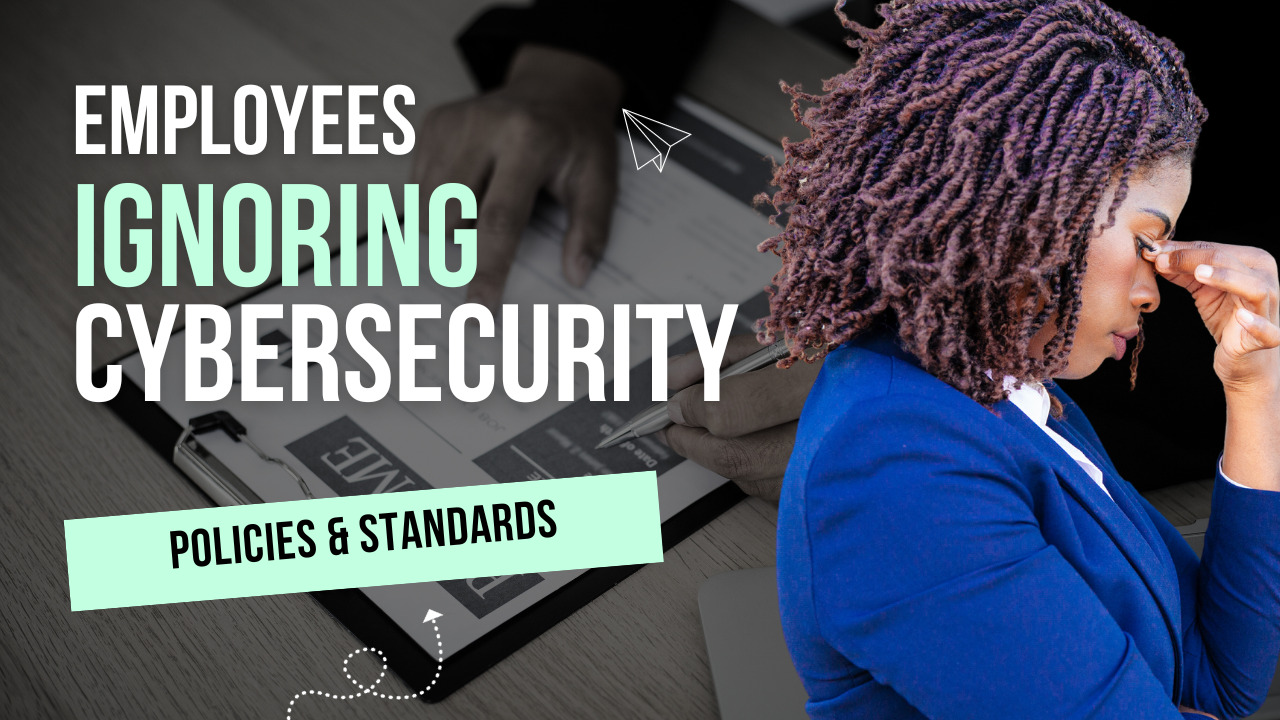Employees Ignore Cybersecurity Policies: Alarming Trends and Solutions
In today’s digital era, cybersecurity is a primary concern for businesses across various industries. Organizations often put in place comprehensive policies to ensure the safety of their data and prevent cyber threats. However, a significant challenge lies in the fact that employees tend to ignore these cybersecurity policies, resulting in increased vulnerability to cyberattacks.
The disregard for cybersecurity policies among employees can be attributed to many factors. Some of these include a lack of understanding, minimal enforcement of policies, and a perceived inconvenience. Businesses must acknowledge these issues and enhance employee compliance, reducing the risk of breaches and protecting the organization’s sensitive information.
Key Takeaways
- Employee disregard for cybersecurity policies is a critical challenge faced by organizations.
- Various factors contribute to this behavior, including lack of understanding and minimal enforcement.
- Businesses must address these issues and prioritize compliance to safeguard valuable data.
Understanding Cybersecurity Policies
Importance
In today’s digital world, you must understand the importance of cybersecurity policies. Cybersecurity policies serve as guidelines that help protect your organization and its sensitive data from cyber threats. By following these policies, you can reduce the risk of data breaches and cyber attacks, ensuring the integrity and confidentiality of your company’s information.
Adhering to cybersecurity policies also helps your organization comply with legal and regulatory requirements, thus preventing potential fines and legal issues. Moreover, a robust cybersecurity policy can boost your company’s reputation, increasing customer trust and loyalty.
Common Misunderstandings
Unfortunately, several common misunderstandings about cybersecurity policies can lead to employees ignoring or circumventing them.
- One-size-fits-all approach: It’s essential to acknowledge that each organization has unique needs and requirements. A cybersecurity policy that works for one company might not suit your organization. You must customize and adapt policies to fit your specific context and industry.
- Too complicated to follow: Often, cybersecurity policies are filled with technical jargon that might be difficult for non-technical employees to understand. To enhance compliance, you should ensure that your policies are written in clear, simple language that all employees can comprehend.
- Lack of training: Employees might be unaware of the policies or not fully understand their importance due to insufficient training. Regular training on cybersecurity issues and policy implementation can help employees grasp their responsibilities and the consequences of non-compliance. As mentioned in this Wall Street Journal article, addressing neutralization techniques and explaining their invalidity is crucial during training courses to ensure employees follow the policies.
By addressing these misunderstandings and educating your employees, your organization can foster a culture of cybersecurity awareness and compliance, ultimately safeguarding its valuable assets and reputation.

Why Employees Ignore Policies
Lack of Awareness
In many cases, employees may ignore cybersecurity policies simply because they are unaware of their existence or importance. Organizations should prioritize educating employees about these policies and their significance in protecting company information and assets. This can be achieved through regular training, workshops, and timely reminders.
Complexity of Policies
Cybersecurity policies can be complicated and difficult for those not well-versed in technical language. When policies are written in convoluted or legal terms, employees may find it tedious to comprehend and follow them. To counter this, companies should consider simplifying their policies, making them accessible and easy to understand for everyone.
Low Perception of Risk
Employees may perceive the risk of cyber threats as low, leading them to downplay the importance of adhering to cybersecurity policies. It is crucial to communicate the potential impacts of not following these guidelines, such as financial losses, reputational damage, and legal consequences. By making the risks clear and tangible, your employees are more likely to take the policies seriously and follow them.
Impact on Organization
Threat to Information Security
Ignoring cybersecurity policies can expose your organization to a myriad of threats. Unauthorized access to sensitive information by hackers can lead to data breaches, tarnishing your organization’s reputation and causing long-term financial and operational damage. Furthermore, vulnerabilities in your IT systems can make it easier for cybercriminals to infiltrate your network, causing immense harm to your business. To minimize these risks, be diligent with password management, software updates, and employee training.
Financial Implications
Disregarding cybersecurity measures can result in significant financial implications. Your organization may face penalties for non-compliance with data protection regulations. In addition, costs associated with data breach response and remediation can be substantial. Not only that, but it may lead to lost revenue due to customer attrition and diminished trust in your brand. By ensuring adherence to cybersecurity policies, you can avoid these costly consequences.
Legal Repercussions
Cybersecurity breaches can lead to legal repercussions in many jurisdictions. Regulations such as the General Data Protection Regulation (GDPR) and the California Consumer Privacy Act (CCPA) require organizations to implement strong data protection measures and impose strict penalties for data breaches. Ignoring cybersecurity policies may put your organization at risk of facing legal actions and hefty financial penalties. Stay informed and proactive about your legal obligations and prioritize following cybersecurity policies and protocols.
Strategies to Enhance Compliance
Educating Employees
To increase compliance with cybersecurity policies, you must educate your employees on the importance of these policies. Conduct regular training sessions to ensure they understand the risks associated with non-compliance and how their actions can impact the company’s security. Provide practical examples and use real-life scenarios to illustrate the consequences of ignoring policies. Encourage them to ask questions and clarify any doubts they may have.
Simplifying Policies
To make it easier for your employees to follow cybersecurity policies, try to simplify them as much as possible. Remove any complex jargon, and present the information clearly and concisely. Use visuals like flowcharts or bullet points to break down complex processes. Provide a summary of the most crucial points that everyone should be aware of, and make it easily accessible, such as posting it in common areas or on the company intranet.
Regular Audits
Periodically conduct audits to evaluate the effectiveness of your cybersecurity policies and employees’ adherence to them. Track compliance by utilizing software that monitors user activity, and consider conducting simulated phishing exercises to assess the vulnerability of your employees. Analyze the audit findings to identify areas for improvement and adjust your policies or training programs as needed. Recognize and reward employees who demonstrate excellent compliance to encourage others to follow suit.
Conclusion
As an employee, it’s crucial to understand the importance of adhering to cybersecurity policies in your workplace. Cybersecurity policies are designed to protect sensitive data and prevent damaging cyber-attacks. Ignoring these policies could lead to significant consequences, such as data breaches, lost productivity, and damage to your company’s reputation.
Always follow your organization’s guidelines to maintain strong cybersecurity practices. Stay educated on the latest threats, be cautious about clicking on unknown links or opening suspicious emails, and use secure passwords that are unique for each account. Ensure you install all necessary software updates, which often contain essential security patches.
Taking cybersecurity seriously in your workplace is the responsibility of every employee. By following these best practices, you can play an active role in safeguarding your organization’s digital security, colleagues, and clients. Remember, a strong cybersecurity culture starts with you, and your actions can make a significant difference in the overall safety of your workplace.






